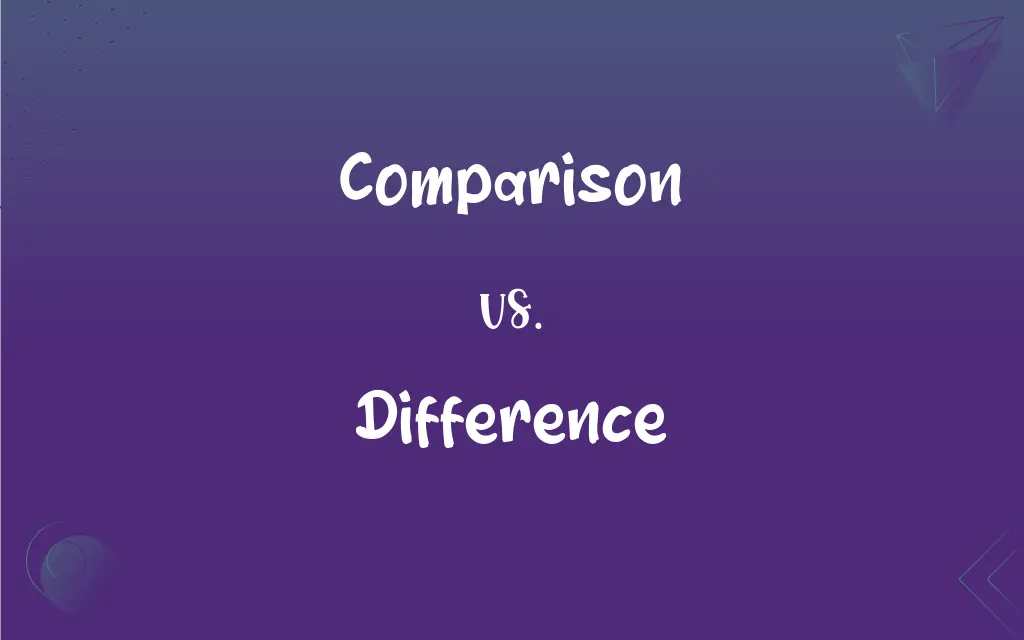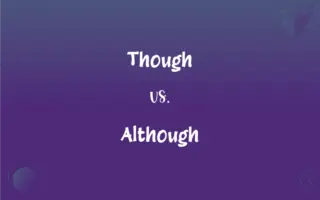Comparison vs. Difference: What's the Difference?
Edited by Aimie Carlson || By Janet White || Published on November 6, 2023
"Comparison" is the act of evaluating two or more items relative to each other, while "Difference" is the quality or aspect that makes one thing distinct from another.

Key Differences
"Comparison" denotes the process of assessing or examining two or more entities to understand their relative qualities. The purpose of a comparison is often to discern similarities or contrasts between these entities. Conversely, "Difference" indicates the distinct qualities or characteristics that set one entity apart from another. It specifically hones in on the disparities rather than the resemblances.
When making a "Comparison," one may evaluate the features, qualities, or performance of items to understand how they stack up against each other. This could include understanding both their similarities and differences. On the other hand, focusing on the "Difference" would mean concentrating solely on the unique or distinct attributes that separate one item from another.
It's also worth noting that "Comparison" can sometimes be subjective, rooted in personal opinions or perspectives. For instance, comparing two works of art might yield different insights based on individual preferences. "Difference," however, tends to be more objective, highlighting clear and definite distinctions between items or concepts.
In essence, while "Comparison" offers a holistic view of the items under scrutiny, encompassing both similarities and contrasts, "Difference" narrows down the scope to only the elements that set them apart.
Comparison Chart
Definition
Evaluating relative qualities of items.
The distinct aspect setting one item apart from another.
ADVERTISEMENT
Scope
Encompasses both similarities and contrasts.
Focuses only on contrasts.
Nature
Can be subjective based on perspective.
Tends to be more objective.
Purpose
Understand relative position or value of items.
Identify unique characteristics.
Usage
Used when assessing items relative to each other.
Used when pointing out disparities between items.
Comparison and Difference Definitions
Comparison
An examination of similarities or differences.
The Comparison of the two poems revealed distinct thematic elements.
ADVERTISEMENT
Difference
A disagreement or dispute.
They resolved their Difference through mediation.
Comparison
An analogy or metaphor indicating likeness.
The poet drew a Comparison between nature and love.
Difference
The result of subtraction in mathematics.
The Difference between ten and seven is three.
Comparison
A relation of items based on a shared quality.
The Comparison of data sets was essential for the research.
Difference
A variation from the norm or standard.
The Difference in quality was immediately noticeable.
Comparison
The act of assessing relative qualities.
She made a Comparison between the two brands before purchasing.
Difference
The quality or condition of being unlike or dissimilar.
Comparison
A consideration of relative merit.
His work paled in Comparison to the excellence of her project.
Difference
An instance of disparity or unlikeness
There is a big difference in sound between a clarinet and an oboe.
Comparison
The act of comparing or the process of being compared.
Difference
A degree or amount by which things differ
A difference in height of three inches.
Comparison
A statement or estimate of similarities and differences.
Difference
A noticeable change or effect
Exercise has made a difference in her health.
Comparison
The quality of being similar or equivalent; likeness
No comparison between the two books.
Difference
A disagreement or controversy
Let's settle our differences.
Comparison
(Grammar) The modification or inflection of an adjective or adverb to denote the positive, comparative, and superlative degrees, as in English, along with the equative degree in certain other languages, such as Irish Gaelic.
Difference
Discrimination in taste or choice; distinction
In this case, the law should make no difference between young and old.
Comparison
The act of comparing or the state or process of being compared.
To bring a thing into comparison with another;
There is no comparison between them
Difference
The amount by which one quantity is greater or less than another.
Comparison
An evaluation of the similarities and differences of one or more things relative to some other or each other.
He made a careful comparison of the available products before buying anything.
Difference
The amount that remains after one quantity is subtracted from another.
Comparison
With a negation, the state of being similar or alike.
There really is no comparison between the performance of today's computers and those of a decade ago.
Difference
To distinguish or differentiate.
Comparison
(grammar) A feature in the morphology or syntax of some languages whereby adjectives and adverbs are inflected to indicate the relative degree of the property they define exhibited by the word or phrase they modify or describe.
In English, adjectives and adverbs have three forms when making a comparison: the plain form "hot", the comparative form "hotter", and the superlative form "hottest".
Difference
(uncountable) The quality of being different.
You need to learn to be more tolerant of difference.
Comparison
That to which, or with which, a thing is compared, as being equal or like; illustration; similitude.
Difference
(countable) A characteristic of something that makes it different from something else.
There are three differences between these two pictures.
Comparison
(rhetoric) A simile.
Difference
(countable) A disagreement or argument.
We have our little differences, but we are firm friends.
Comparison
(phrenology) The faculty of the reflective group which is supposed to perceive resemblances and contrasts.
Difference
Significant change in or effect on a situation or state.
It just won't make much difference to me.
It just won't make much of a difference to anyone.
Comparison
The act of comparing; an examination of two or more objects with the view of discovering the resemblances or differences; relative estimate.
As sharp legal practitioners, no class of human beings can bear comparison with them.
The miracles of our Lord and those of the Old Testament afford many interesting points of comparison.
Difference
(countable) The result of a subtraction; sometimes the absolute value of this result.
The difference between 3 and 21 is 18.
Comparison
The state of being compared; a relative estimate; also, a state, quality, or relation, admitting of being compared; as, to bring a thing into comparison with another; there is no comparison between them.
Difference
(obsolete) Choice; preference.
Comparison
That to which, or with which, a thing is compared, as being equal or like; illustration; similitude.
Whereto shall we liken the kingdom of God? Or with what comparison shall we compare it?
Difference
(heraldry) An addition to a coat of arms to distinguish two people's bearings which would otherwise be the same. See augmentation and cadency.
Comparison
The modification, by inflection or otherwise, which the adjective and adverb undergo to denote degrees of quality or quantity; as, little, less, least, are examples of comparison.
Difference
(logic) The quality or attribute which is added to those of the genus to constitute a species; a differentia.
Comparison
A figure by which one person or thing is compared to another, or the two are considered with regard to some property or quality, which is common to them both; e.g., the lake sparkled like a jewel.
Difference
(logic circuits) A Boolean operation which is true when the two input variables are different but is otherwise false; the XOR operation ().
Comparison
The faculty of the reflective group which is supposed to perceive resemblances and contrasts.
Difference
(relational algebra) The set of elements that are in one set but not another ().
Comparison
To compare.
Difference
To distinguish or differentiate.
Comparison
Examining resemblances or differences
Difference
The act of differing; the state or measure of being different or unlike; distinction; dissimilarity; unlikeness; variation; as, a difference of quality in paper; a difference in degrees of heat, or of light; what is the difference between the innocent and the guilty?
Differencies of administration, but the same Lord.
Comparison
Relation based on similarities and differences
Difference
Disagreement in opinion; dissension; controversy; quarrel; hence, cause of dissension; matter in controversy.
What was the difference? It was a contention in public.
Away therefore went I with the constable, leaving the old warden and the young constable to compose their difference as they could.
Comparison
Qualities that are comparable;
No comparison between the two books
Beyond compare
Difference
That by which one thing differs from another; that which distinguishes or causes to differ; mark of distinction; characteristic quality; specific attribute.
The marks and differences of sovereignty.
Difference
Choice; preference.
That now he chooseth with vile differenceTo be a beast, and lack intelligence.
Difference
An addition to a coat of arms to distinguish the bearings of two persons, which would otherwise be the same. See Augmentation, and Marks of cadency, under Cadency.
Difference
The quality or attribute which is added to those of the genus to constitute a species; a differentia.
Difference
The quantity by which one quantity differs from another, or the remainder left after subtracting the one from the other.
Difference
To cause to differ; to make different; to mark as different; to distinguish.
Thou mayest difference gods from men.
Kings, in receiving justice and undergoing trial, are not differenced from the meanest subject.
So completely differenced by their separate and individual characters that we at once acknowledge them as distinct persons.
Difference
The quality of being unlike or dissimilar;
There are many differences between jazz and rock
Difference
A variation that deviates from the standard or norm;
The deviation from the mean
Difference
A disagreement or argument about something important;
He had a dispute with his wife
There were irreconcilable differences
The familiar conflict between Republicans and Democrats
Difference
A significant change;
The difference in her is amazing
His support made a real difference
Difference
The number that remains after subtraction; the number that when added to the subtrahend gives the minuend
Difference
A distinguishing quality between things.
The main Difference between the two is their color.
Difference
A disparity in character or form.
There's a marked Difference in their approaches to teaching.
FAQs
What does "Comparison" primarily focus on?
"Comparison" focuses on evaluating the relative qualities of two or more items.
What's the primary objective of identifying a "Difference"?
The primary objective is to highlight the unique or distinct qualities of items.
Is "Difference" only about contrasting aspects?
Yes, "Difference" specifically points out the contrasting or distinct attributes of things.
Can a "Comparison" be subjective?
Yes, a "Comparison" can sometimes be based on personal opinions or perspectives.
Is "Comparison" always about finding similarities?
No, "Comparison" can highlight both similarities and differences.
How does "Comparison" aid in decision-making?
"Comparison" helps assess the relative merits or demerits of choices, guiding informed decisions.
Is "Difference" always objective?
While "Difference" often points to objective disparities, interpretations can vary based on context.
Is "Difference" always negative?
No, "Difference" neutrally denotes distinction; the value judgment depends on context.
In mathematics, what does "Difference" signify?
In mathematics, "Difference" signifies the result of subtraction.
Can "Comparison" be used in literary contexts?
Yes, "Comparison" can be used in literary contexts, often as metaphors or analogies.
Can "Difference" denote a disagreement?
Yes, "Difference" can also mean a disagreement or dispute between parties.
Are "Comparison" and "Difference" opposites?
No, while "Comparison" assesses relative qualities, "Difference" points out distinctions.
Can "Comparison" be synonymous with analogy?
In some contexts, especially literature, a "Comparison" can be an analogy indicating likeness.
How does "Comparison" relate to quality assessment?
"Comparison" can help determine the relative quality or value of products, services, or ideas.
Can "Difference" refer to a variation in standard?
Yes, "Difference" can indicate a deviation from a norm or standard.
Is "Difference" used in discussions on diversity?
Yes, "Difference" can be used to discuss diverse identities, cultures, or perspectives.
In what contexts is "Comparison" commonly used?
"Comparison" is used in shopping, research, decision-making, literature, and more.
How is "Comparison" used in research?
In research, "Comparison" is used to assess and relate data sets, theories, or methodologies.
Does "Difference" always indicate a large disparity?
No, "Difference" can indicate both minor and major disparities between items.
Is there a mathematical interpretation of "Comparison"?
Yes, in mathematics, "Comparison" can relate to evaluating the relative size or value of numbers.
About Author
Written by
Janet WhiteJanet White has been an esteemed writer and blogger for Difference Wiki. Holding a Master's degree in Science and Medical Journalism from the prestigious Boston University, she has consistently demonstrated her expertise and passion for her field. When she's not immersed in her work, Janet relishes her time exercising, delving into a good book, and cherishing moments with friends and family.
Edited by
Aimie CarlsonAimie Carlson, holding a master's degree in English literature, is a fervent English language enthusiast. She lends her writing talents to Difference Wiki, a prominent website that specializes in comparisons, offering readers insightful analyses that both captivate and inform.






































































